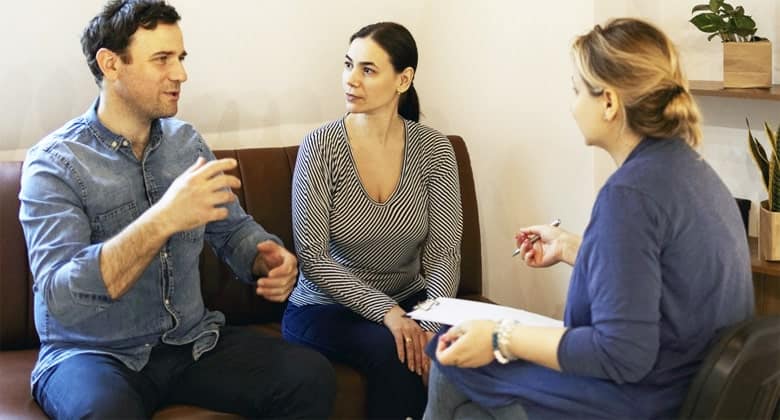Infidelity counseling tackles trust issues in a relationship. The word infidelity means lack of faith and comes from the Latin church’s ‘infidelitas’ which means, not faithful. Infidelity in a marriage refers to someone breaking their vows. Such betrayal can severely strain a relationship and extramarital affairs almost always leave the other person feeling devastated, alone, and confused.
In legal terms, infidelity refers to the act of being unfaithful or disloyal in a marriage. It involves engaging in sexual activities with someone outside of the committed partnership without the knowledge or consent of their partner. Infidelity can take different forms, including physical affairs, emotional affairs, or a combination of both. Physical infidelity involves engaging in sexual activities with someone other than one’s partner, while emotional infidelity involves developing a deep connection or romantic attachment to someone outside the committed relationship without engaging in physical intimacy. Either form of infidelity can be highly distressing and damaging to the trust, emotional connection, and stability within a relationship. It is often considered a breach of the agreed-upon commitment and grounds for divorce.

A man removing wedding ring, but still considering infidelity counseling.
Can Infidelity Counselling Help Couples with Trust Issues?
Yes, infidelity counseling can be beneficial for couples who have trouble trusting each other. Infidelity causes significant emotional pain and a breakdown in communication. Counseling can provide a support structure in which both partners can express their feelings, concerns, and needs.
Here are a few ways infidelity counseling can help,
- Emotional support: A counselor can provide a safe space for both partners to express their emotions and work through the pain, anger, and betrayal caused by infidelity. They can help each individual process their feelings and provide guidance on healthy coping mechanisms.
- Rebuilding trust: Rebuilding trust is a crucial aspect of recovering from infidelity. A skilled counselor can guide the couple through exercises and discussions to gradually rebuild trust, establish transparency, and promote open communication.
- Communication and understanding: Infidelity often stems from underlying issues within a relationship, such as lack of intimacy, communication problems, or unmet needs. A counselor can facilitate productive conversations, teach effective communication techniques, and help the couple address these underlying issues.
- Setting boundaries and expectations: In counseling, couples can discuss and establish clear boundaries and expectations for their relationship moving forward. This process allows both partners to feel secure and creates a framework for rebuilding trust.
- Developing strategies for the future: Counseling can assist couples in developing strategies to prevent future infidelity and maintain a healthy, fulfilling relationship. This may involve exploring ways to enhance emotional intimacy, strengthening the couple’s connection, and fostering a sense of commitment.
It’s important to note that effective counseling requires trust and the willingness of both partners to participate. Their commitment to the process, and to the relationship is critical. It may take time, effort, and patience to heal and rebuild the relationship, but counseling can provide valuable guidance and support along the way.

Partners seeking couples counselling for guidance after infidelity.
How Does Infidelity Counseling Affect Gottman Couples Therapy?
Trust is important in therapy and the lack of trust can have a significant impact on couples counseling, including Gottman Couples Therapy. When infidelity occurs within a relationship, it adds an extra layer of complexity and emotional distress that requires specific attention. It requires the participants make a commitment and keep their word. Infidelity impacts Gottman couples counseling because the therapist will need to,
-
- Focus on healing from the betrayal: Infidelity brings a deep sense of betrayal and trust issues into the counseling process. In couples counseling, the therapist will prioritize addressing the impact of the infidelity, helping both partners process their emotions, and providing a supportive environment for healing.
- Rebuild trust and restore the commitment: Rebuilding trust is a crucial aspect of recovering from infidelity. In Gottman couples counseling, therapists work with the couple to establish a foundation of safety and explore ways to rebuild trust. They may introduce exercises and techniques to promote transparency, accountability, and open communication to facilitate the restoration of commitment.
- Address underlying relationship issues: Infidelity often points to underlying issues within the relationship that may have contributed to the breach of trust. In counseling, the therapist helps the couple identify and address these underlying issues, such as communication problems, unmet needs, or lack of intimacy. Working through these issues is essential for repairing and strengthening the relationship.
- Improve communication and emotional connection: Infidelity can severely impact the communication and emotional connection within a relationship. In couples counseling, therapists utilize Gottman’s research-based techniques to enhance communication skills, promote empathy, and facilitate a deeper emotional connection between partners. These tools help the couple rebuild their emotional bond and create a more resilient relationship.
- Develop a plan for prevention and future growth: Gottman couples counseling also focuses on equipping the couple with skills and strategies to prevent future infidelity and promote long-term relationship satisfaction. Therapists work with the couple to establish clear boundaries, develop effective conflict resolution skills, and cultivate ongoing growth and development within the relationship
One parent’s infidelity can have lasting impacts on their children. Grief and bad behavior down the road can result from the anxiety, stress and depression the unfaithful act caused. Some families have been able to move past the upset with time and therapy but it requires a commitment to revisit past events, and to explore difficult-to-acknowledge thoughts and emotions which can be difficult for both partners.
Infidelity is part of the human condition and the subject of countless movies and TV shows, classical literature and popular fiction stories. It’s what rappers rhyme about and country singers croon about, and all poets lament. Yet despite these warnings and cautionary tales, infidelity is what wrecks most marriages, breaks-up most families and changes lives, young and old. The act itself is usually just a symptom of more complex issues. Something caused one partner to stray and the impulse could come from a secret hidden away and buried so deep that only a professional could ever find and straighten things out.

